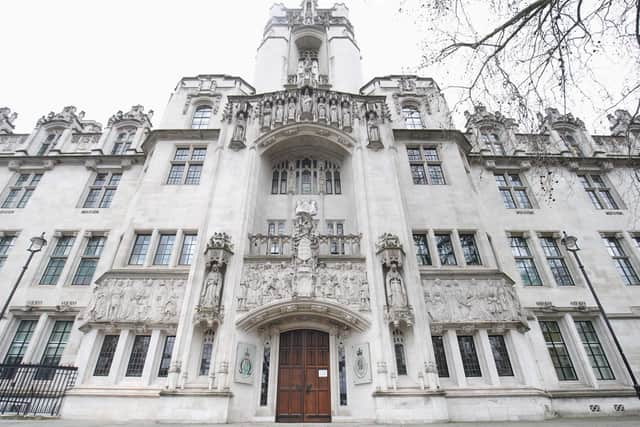Indyref2 Supreme Court: Scottish independence Supreme Court case explained, what might happen next
Under the Scotland Act 1998, in order to introduce a Bill into the Scottish Parliament, the minister in charge must state that its provisions are within devolved competence and, under the Scottish Ministerial Code, such statements must be “cleared” with the law officers in advance. But the Lord Advocate said that she did not have the necessary degree of confidence to do so, given long-standing uncertainty over Holyrood’s legal authority to legislate for an independence referendum.
The Lord Advocate’s written submissions set out both sides of the legal debate (although she will argue at the oral hearing that the draft Bill is within devolved competence).
Advertisement
Hide AdAdvertisement
Hide AdEssentially, the issue turns on whether an advisory referendum – one which seeks to ascertain the views of the Scottish people on independence, but does not do anything, legally, to bring it about– “relates to” the Union and/or the UK Parliament, both being matters reserved to Westminster. While a referendum Bill undeniably has something to do with those reserved matters, previous decisions have held that “relates to” requires more than “a loose or consequential connection”, and depends on how the purpose and effect of the Bill are understood. A narrow reading of “relates to” would bring a referendum Bill within devolved competence, whereas a broad reading would render it outwith competence.


The Supreme Court will also hear from the Advocate General for Scotland, on behalf of the UK Government, who argues that an independence referendum unequivocally relates to reserved matters. In addition, the SNP has been allowed to make a written intervention. It argues that “relates to” should be interpreted in the light of the right of the Scottish people to self-determination, and hence a narrow reading adopted.
Alongside this substantive issue, the Supreme Court will also hear argument on the legality of the reference procedure used by the Lord Advocate.
Typically, challenges to legislative competence are raised either once a Bill has been passed by the Scottish Parliament, or after it has received Royal Assent and become an Act. In this case, though, the Lord Advocate has referred the draft Bill before it has been introduced at Holyrood, invoking a broad, but previously unused, power to refer questions about reserved matters to the Supreme Court. She argues that it is in the public interest to settle the question whether Holyrood has power to legislate for a referendum, and that there might not be any other way of doing so, because the degree of uncertainty is so great as to prevent a Bill ever being introduced.
By contrast, the Advocate General argues that it is inappropriate to use this procedure to challenge a draft Bill, and indeed he sought to have the reference struck out as incompetent. However, the Supreme Court decided to hear argument on this procedural issue.


This means that the Supreme Court’s decision has several possible permutations. It might hold that – the reference is incompetent, and so it will not decide the substantive issue, or the reference is competent, hence it must decide the substantive issue, or the reference is incompetent, but it will give an opinion anyway on the substantive issue.
Having heard argument on the issue, it seems likely that the court will give a ruling on the legality of the draft referendum Bill, irrespective of what it decides on the legality of the reference itself. Informed legal opinion tends towards the Supreme Court holding that the Bill does relate to reserved matters and is therefore outwith devolved competence, especially given restrictive rulings from the Supreme Court in recent devolution cases. However, the Court’s decisions in constitutional cases can be unpredictable, and the Lord Advocate’s and SNP’s submissions suggest that there is more to be said in favour of a finding that the draft Bill is within competence than might have been thought.
So what happens after the Court has made its decision?
If the Court holds that the draft Bill is within competence, legislation will no doubt swiftly follow to pave the way for a referendum in October 2023, in accordance with the timetable set out by the First Minister in June. If a vote does go ahead, it will be without the sanction of the UK Government, unlike the 2014 referendum. Nevertheless, given the arguments made in the Advocate General’s written submissions about the political significance of the referendum, it will be difficult for unionists to continue to dismiss it as a “pretendyref”.
Advertisement
Hide AdAdvertisement
Hide AdIf the Court holds that Holyrood cannot lawfully hold a referendum, the First Minister has said that the SNP will treat the next UK General Election as a de facto referendum. I.e., they will campaign on the single issue of independence and seek a majority in Scotland on that basis. This is – for various reasons – a highly uncertain strategy, and is probably best understood, not as an alternative to a second independence referendum, but as a way of putting pressure on the UK Government to allow one to take place lawfully. Currently, there is no sign of either a Conservative or Labour Government being willing to do so. However, given the state of public opinion in Scotland, UK parties need to be mindful of the risks of denying a democratic route to independence.
Aileen McHarg is Professor of Public Law and Human Rights at Durham University
Comments
Want to join the conversation? Please or to comment on this article.